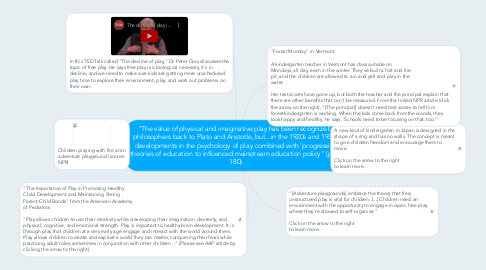"The value of physical and imaginative play has been recognize by philosophers back to Plato and Aristotle, but...in the 1920s and 1930s, developments in the psychology of play combined with 'progressive' theories of education to influenced mainstream education policy" (page 180).
by Becky S

1. In this TED Talk called "The decline of play," Dr. Peter Gray discusses the topic of free play. He says free play is a biological necessity, it's in decline, and we need to make sure kids are getting more unscheduled play time to explore their environment, play, and work out problems on their own.
2. "The Importance of Play in Promoting Healthy Child Development and Maintaining Strong Parent-Child Bonds" from the American Academy of Pediatrics "Play allows children to use their creativity while developing their imagination, dexterity, and physical, cognitive, and emotional strength. Play is important to healthy brain development. It is through play that children at a very early age engage and interact with the world around them. Play allows children to create and explore a world they can master, conquering their fears while practicing adult roles, sometimes in conjunction with other children..." (Please see AAP article by clicking the arrow to the right).
3. Children playing with fire at an adventure playground (source: NPR)
4. A new kind of kindergarten in Japan is designed in the shape of a ring and has no walls. The concept is meant to give children freedom and encourage them to move. Click on the arrow to the right to learn more.
5. "Forest Monday" in Vermont A kindergarten teacher in Vermont has class outside on Mondays, all day, even in the winter. They've built a fort and fire pit, and the children are allowed to run and yell and play in the water. Her test scores have gone up, but both the teacher and the principal explain that there are other benefits that can't be measured. From the linked NPR article (click the arrow on the right), "[The principal] doesn't need test scores to tell him forest kindergarten is working. When the kids come back from the woods, they look happy and healthy, he says. 'Schools need to be focusing on that, too.'"
6. "[Adventure playgrounds] embrace the theory that free, unstructured play is vital for children. [...] Children need an environment with the opportunity to engage in open, free play where they're allowed to self-organize." Click on the arrow to the right to learn more.


